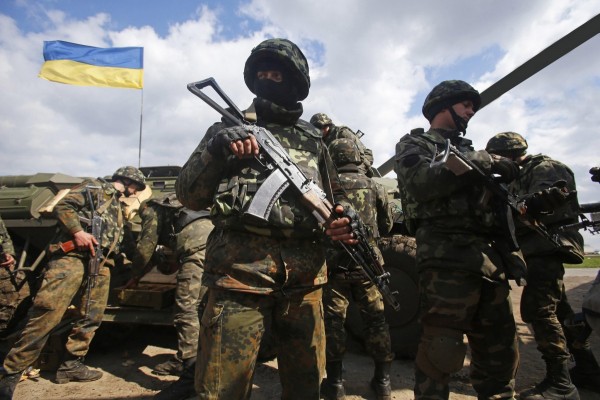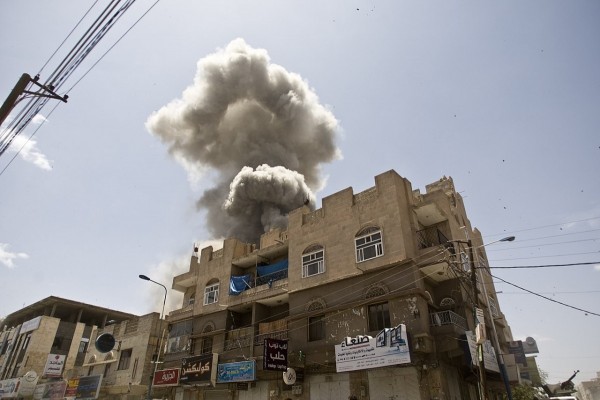-

Bombs and Waffles: the NDP and NATO in the twentieth century
Long-time observers of the NDP should not be surprised at the internal disarray over Canadian support for NATO. According to Huron University College professor David Blocker, the party’s stance on Canadian involvement in the alliance has been the source of considerable debate and internal tension within the NDP and the left in Canada since the party’s founding in 1961.
-

Weakness and paranoia are behind the Western war scare
What drives the Western war scare has more to do with the West itself than with Putin’s unpredictability. Domestic and foreign affairs of the last decade have left the West weak and deeply confused. This loss of confidence does a disservice to conducting a measured assessment of Russia’s foreign policy and motives in its relations with Ukraine.
-

Russia doesn’t count
Ratcheting up tensions during a global pandemic is nothing less than a shoddy diversion; another symptom of the weakening of public discourse, now fueled by comic-book like personality-driven politics. What Russia and Ukraine both need is no different than that eternal human dream of everyone else everywhere: better living and hope for a brighter future for all citizens.
-

On Ukraine-Russia, don’t let war fever consume us
War is in the air. As most everybody knows by now, Russia has assembled a formidable force at various locations near Ukraine’s borders. Satellite images of military equipment and amateur video of lines of tanks convey the menace. Diplomats are talking but some are also withdrawing from the Ukrainian capital. Few are neutral or nuanced about the crisis.
-

Saudi Arabia is escalating its attacks on Yemen, and Canada is helping them do it
Canada’s complicity in the war against the Yemeni people is material (weapons sales) and diplomatic (supporting the Saudi line on the conflict). Predictably, coverage of the recent bombardments in Canadian state media are devoid of any of the urgency that the Saudi-led assault demands, while instability in “enemy” states like Cuba, Venezuela, China, or Russia receive wall-to-wall analysis from a wide range of “experts.”
-

The hidden origin of the escalating Ukraine-Russia conflict
The question of which side carried out the 2014 Maidan massacre is central to understanding the “bloodiest and most controversial hours of European conflict since the end of the Cold War,” and the main tipping point in the escalating conflict between the West and Russia over Ukraine. According to Ivan Katchanovski, the origins of the conflict are often misrepresented, omitted or even covered-up.
-

Humanity at ‘doom’s doorstep’ says Bulletin of the Atomic Scientists
Top scientists responsible for the “Doomsday Clock” issued a stark warning about how close the world is to catastrophe due to the climate emergency, nuclear weapons, and “disruptive technologies in other domains.” Launched by the Bulletin of the Atomic Scientists in 1947 as a symbol for “how close we are to destroying our world,” the clock remains at 100 seconds to midnight for the third year straight.
-

On NATO all parties agree—follow orders without question
NATO’s proponents often claim it’s a democratic force, but in Canada’s case the alliance highlights the hollowness of our democracy. A healthy polity requires vigorous debate on important issues, but no major party opposes this country’s membership in the military alliance. In fact, the NDP has gone to great lengths to block members from expressing themselves on NATO.
-
Reducing conflict with China an environmental necessity
Arms manufacturers and militaries utilize propaganda to hype Chinese military power to rationalize expenditures on weapons of war. This gobbles up public resources required for a just transition away from fossil fuels. Whatever lies and exaggerations the militarists may pedal, it’s the Western-led military–industrial complex we should be most worried about—and the environmental movement needs to confront this reality head-on.
-

How the Canadian military is fuelling the climate crisis
Though it receives relatively little attention, the Canadian Forces’ ecological footprint is immense. In fact, DND emits far more carbon than any other institution. According to the government’s 2017 defence policy review, DND “represents more than half of the Government of Canada’s greenhouse gas emissions.” Despite this, CF operations are exempt from the government’s emission reduction targets.




